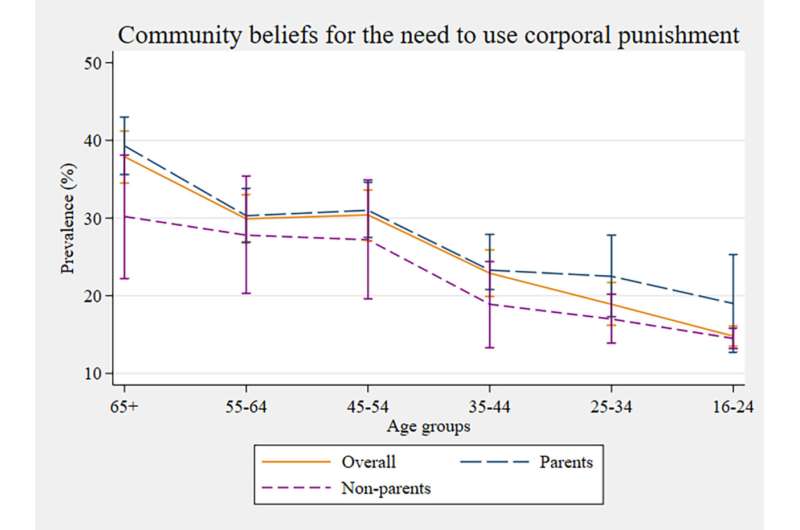This article has been reviewed according to Science X's editorial process and policies. Editors have highlighted the following attributes while ensuring the content's credibility:
fact-checked
trusted source
proofread
Changing attitudes indicate Australia open to banning smacking of children

Australia should join 65 other nations that have passed laws against corporal punishment of children in all settings to advance its goal of reducing all forms of violence against children, QUT researchers say.
- 6 in 10 of 8,500 Australians surveyed were smacked or physically punished as children
- Survey shows only 14% of parents aged 16–24 have used physical punishment; among those surveyed aged 65 and over, 64.2% had used it
- 7 in 10 parents think smacking children is not necessary
- A public health strategy including non-violent alternatives to accompany potential legislative change is needed.
Dr. Divna Haslam and Professor Ben Mathews, from QUT School of Law, said the time was right for legislation to ban corporal punishment.
Dr. Haslam led the first national Australian study of prevalence and attitudes to corporal punishment which analyzed data regarding corporal punishment contained in the Australian Child Maltreatment Study. The study, "The prevalence of corporal punishment in Australia: Findings from a nationally representative survey," is published in the Australian Journal of Social Issues.
"Corporal punishment is defined here as the use of physical force to cause pain, but not injury, for the purposes of behavioral discipline or correction," Dr. Haslam said.
"We asked 8,503 Australians aged 16 and over if an adult had ever smacked or physically punished them to discipline them for misbehavior and 6 in 10 people said 'yes.'"
"Decades of research has shown corporal punishment is associated with a range of adverse outcomes including increased aggression, both externalizing and internalizing behavior problems, decreases in cognitive ability, mental health problems, and even neurological changes."
Dr. Haslam said only a quarter (26%) of those surveyed believed corporal punishment was necessary in raising a child.
"Of note, Australians aged under 45 are much less likely to view corporal punishment as necessary than those over 45, " she said.
"This suggests the Australian community may be receptive to attempts for law reform in this area.
"There's also evidence suggesting the use of corporal punishment may be declining. Younger parents were only a tenth as likely to use physical punishment as the oldest parents."
Dr. Haslam said corporal punishment by parents was lawful in Australia because legislation and common law in all states and territories permitted parents to use "reasonable" physical force for the purposes of discipline or punishment.
"A study of eight countries that instituted legal bans against corporal punishment found rates of corporal punishment and beliefs about its necessity decreased in only three of the eight countries following legislative change," she said.
"However, the countries with greater positive change had a public health strategy that raised awareness about corporal punishment's adverse effects and provided parenting education on alternative strategies to respond to children's behavior."
Dr. Haslam and colleagues argue Australia needs legal change to create a new social norm prohibiting violence against children, combined with a public health strategy promoting appropriate responses to challenging child behaviors.
The study also showed:
- Overall, half of Australian parents (53.7%) have used corporal punishment, with younger parents being much less likely to use it than older parents.
- Men are more likely to believe corporal punishment is necessary than women.
- Mothers and fathers were equally likely to use corporal punishment.
- Parents are slightly more likely to believe corporal punishment is necessary than non-parents (30.9% compared to 19%)
People who had experienced corporal punishment as children were more likely to use corporal punishment and believe it was necessary, (60.4% versus 53.7%) suggesting intergenerational patterns.
Dr. Haslam said the results were consistent with a steady decline in the use of corporal punishment over time, with fewer younger parents using it and believing it was necessary compared with older parents.
"It's very reassuring to see younger parents are less likely to use physical discipline.
"Corporal punishment is associated with harm and it has no long-term benefits and we know there are effective non-violent alternatives.
"This study has some good news regarding beliefs about corporal punishment, although an area of concern is that 6 in 10 young people aged 16–24 reported receiving physical discipline in childhood."
More information: Divna M. Haslam et al, The prevalence of corporal punishment in Australia: Findings from a nationally representative survey, Australian Journal of Social Issues (2023). DOI: 10.1002/ajs4.301
Provided by Queensland University of Technology




















